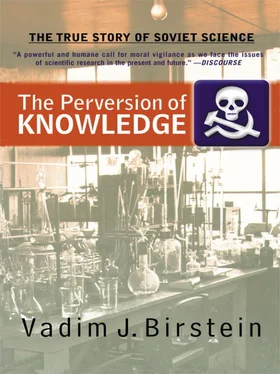An editorial article in the same issue of Pravda , evidently prepared with the involvement of the Politburo, pointed to the “errors” in biology:
This occurred above all because the Presidium of the Academy of Sciences and the Bureau of the Biological Division forgot the most important principle in any science—the Party principle…. Meanwhile, it must be noted that questions of scientific leadership are not limited to biology. The Presidium of the Academy of Sciences and the Bureau of the Biology Department, having admitted errors in the leadership of biological science, must draw for themselves the necessary conclusions not only in the sphere of biology, but in all other spheres of scientific activity. 311
There is no doubt in my mind that Stalin and the Party wanted to extend the control they had gained over biological science to all branches of science. Stalin was concerned that some academicians remained independent even twenty years after the Bolshevization of the academy. At any rate, discussions similar to those at the August session occurred in physiology in June 1950, in organic chemistry against the resonance theory in June 1951, and in geology (lithology) in 1951–1952. 312Another discussion, against Albert Einstein’s theory of relativity, was planned in theoretical physics in 1949. 313Like Mendelist genetics, cybernetics was officially pronounced “a bourgeois pseudoscience.”
Numerous orders of the minister of higher education, Sergei Kaftanov, followed the August 1948 Session. 314Academician Vasilii Nemchinov, who dared to support geneticists at the August session (although he was not a biologist but an economist), was dismissed from his post as director of the Timiryazev Agricultural Academy, and Academician Zhebrak was removed as chair of the Department of Genetics of this academy. Zhebrak was replaced by Lysenko himself. According to Order No. 1208 from Kaftanov, the whole staff of the Department of Darwinism and its chair, Academician Schmalhausen, as well as the staff of the Department of Genetics, Professor Sabinin (chair of the Department of Plant Physiology), Yudintsev, and many others were dismissed from the Biology Faculty. Later, the same Kaftanov fought against chemists who followed the resonance theory. In 1952, after he had become director of the Karpov Institute of Physical Chemistry, he appealed to the minister of chemical industry to order the firing of those who worked on “the vicious resonance theory, which had been rejected by Soviet chemists.” 315
In 1948, Lysenko did not forget any of those who opposed him. Order No. 1259 dismissed Professor Boris Zavadovsky, whom Lysenko mentioned in his speech, as chair of the Department of Darwinism of the Moscow Pedagogical Institute (i.e., College). In 1949, Professor Zavadovsky lost his last job, director of the Timiryazev Biological Museum, and he died in 1949. 316The whole staff of the Departments of Darwinism and Genetics at Moscow University (as well as those in Leningrad and other cities) was replaced by Lysenkoists. On September 8, 1948, Minister Kaftanov proudly reported in Izvestiya about the staff changes at the universities and concluded: “The struggle in the field of biology has ended in a complete triumph of Michurin’s doctrine, preserving a new stage in the development of materialistic biology.” 317
As a result of these actions, thousands of biologists lost their jobs. “I remember 1948,” recalled the Russian biologist Nikolai Vorontsov. 318“That fall, in all universities, in all institutions, three thousand biologists lost their jobs and all possibility of research—three thousand. ” 319Lysenko’s main ideologist, Prezent, was appointed Biology Faculty dean and chair of the Department of Darwinism at both Moscow and Leningrad Universities.
THOSE WHO LOST AND THOSE WHO GAINED
The fates of the three scientists who started the fight against Lysenko in 1947—Schmalhausen, Formozov, and Sabinin—were different. When Academician Ivan Schmalhausen (1884–1963) was dismissed from his university and academy positions in 1948, he was an internationally recognized scientist. 320Until 1937, he lived in Kiev, where he headed the Institute of Zoology and Botany of the Ukrainian Academy of Sciences, which he had organized in 1930. In 1935, he was elected to the USSR Academy of Sciences, and in 1936 he was appointed director of the academy’s A. N. Severtsov Institute of Evolutionary Morphology in Moscow. In 1939, he also became professor and chair of the Evolutionary Department at Moscow State University. He was a recognized specialist in evolutionary morphology of vertebrates and the author of fundamental monographs on evolution. But in the Lysenkoist Moscow of 1948, he could not find a job.
With great difficulty, because of the opposition of Party officials, the director of the Zoological Institute in Leningrad, Academician Pavlovsky, added Academician Schmalhausen to the staff of his institute as senior researcher on December 1, 1948. 321Later, in 1952, Academician Pavlovsky could not hire another anti-Lysenkoist, Professor Polyansky, because two anti-Lysenkoists, Academician Schmalhausen and Professor A. Strelkov, were already working there. In 1955, Schmalhausen was given a small group of junior researchers. Before his death in 1963, Schmalhausen wrote two more fundamental monographs, The Origin of Terrestrial Vertebrates 322and Regulation of Form Development During Individual Development .
As a result of Minister Kaftanov’s order, in 1948 Professor Aleksandr Formozov (1899–1973), the well-known naturalist, ecologist, and vertebrate zoologist, lost his job at Moscow University. He was also dismissed from the editorial board of the Zoological Journal . 323This was punishment for Formozov’s presentation, “Observation on Intraspecific Competition for Survival in Vertebrates,” at the November 1947 conference. Fortunately, Professor Formozov was also an employee of the Academy Institute of Geography, where he headed the Biogeography Department from 1945 until 1963. The orders of the Academy Presidium and Minister Kaftanov targeted biological institutions only, and this saved Professor Formozov. He successfully continued to work on ecological and evolutionary problems of mammals and birds at the Institute of Geography. He was involved as well in the organization of a network of nature reserves in the USSR.
The fate of Professor Dmitrii Sabinin (1889–1951) was the most tragic. 324His fundamental monograph on plant physiology was withdrawn from the publishing house. Lysenko could not forget that in the November 1947 conference, Sabinin presented the lecture “On Intraspecies Competition in Artificially Planted and Naturally Growing Plants,” in which he completely destroyed Lysenko’s theoretical inventions, using Lysenko’s own examples of species. After two years of unemployment, Sabinin was accepted at the Academy Soil Institute. However, the new, pro-Lysenkoist secretary academician Oparin did not approve Sabinin’s appointment, and Sabinin became an outcast in Moscow. Finally, Sabinin left Moscow for the Crimea and started to work on algae of the Black Sea. But all the pressure was too much for him, and on April 22, 1951, he shot himself.
Isaak Prezent (1902–1969) was triumphant. In 1948 Prezent, who had no training in biology, became an academician of the Agricultural Academy (he was on Stalin’s list of appointees), dean of the Biology Faculty in Moscow, and chair of the Departments of Darwinism at both Moscow and Leningrad Universities. At the August 1948 Session of VASKhNIL, Prezent’s speech (thirty pages) was only a little bit shorter than Lysenko’s (thirty-nine pages). His conclusion was:
…Our Soviet biologists, armed with the Michurinian doctrine, have already demonstrated the fallaciousness of Morganism up to the hill. Nobody will be led astray by the Morganists’ false analogies between the invisible atom and the invisible gene. Far closer would be the analogy between the invisible gene and the invisible spirit…. We shall continue to expose them [the Morganists] as adherents of an essentially false scientific trend, a pernicious and ideologically alien trend, brought to our country from foreign shores. (Applause.) We, Michurinists, will… develop this remarkable [Michurinist] doctrine by the efforts of the entire body of the many thousands of Michurinists…. The future in biology belongs to Michurin, and only to Michurin. 325
Читать дальше











